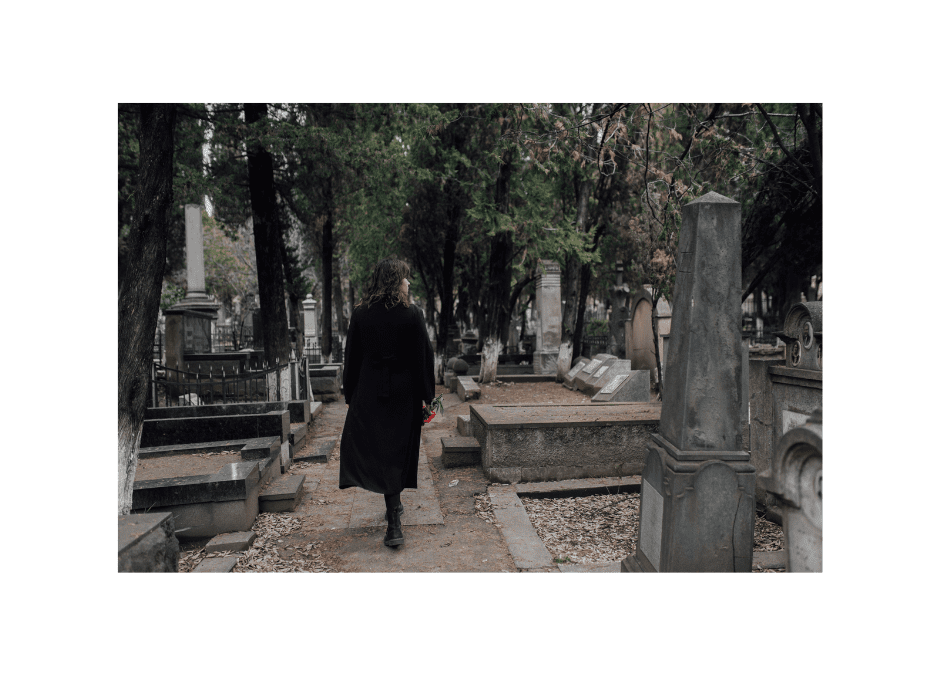I was in seminary in Boston when the pandemic hit. A couple of friends and I were on spring break in Maine when we got the email from our dean telling us we wouldn’t be returning to in-person classes after the break. That was the first of many communications I received that moved life online. A few weeks later, I watched my church’s Easter service on YouTube from my apartment. My pastor had taken to recording weekly sermons outside around Boston. The usually overcrowded areas were suddenly empty in the videos. It was eerie.
The Easter service was recorded in a cemetery. But unlike the videos of an empty streets and parks, I didn’t find the cemetery eerie. It was April 2020, and city officials and doctors were sounding the alarm that a surge was coming and COVID-19 was about to hit Boston the hardest. It was before vaccines, before we knew to wear masks, back when we were all singing happy birthday while scrubbing our hands raw twelve times a day. The whole city vibrated with fear and anxiety. So when my pastor appeared in a graveyard, it surprisingly did not feel eerie to me. It felt familiar.
And even though it was triumphant Easter Sunday, the pastor said, “I know you and I are living somewhere today between Maundy Thursday and Good Friday.”
Today we are not living in that same fearful world that we were existing in two years ago, but we are not unfamiliar with the graveyard. In this time of war and continuing disease, we know Good Friday all too well.
We are familiar with the story and the reality of death—so familiar in fact that we might be tempted to skip over the horrors of crucifixion for the promise of resurrection. In response to this temptation, I am reminded of the women who stayed with Jesus during the crucifixion, the women were refused to look away, the women we committed to follow Jesus until the end, the women who chose to be present rather then flee.
I’ve always been touched by the persistent presence of these women. While other disciples disappeared into the shadows, these women remained. It strikes me that the story of Jesus’ crucifixion was told, and continues to be told today, in part because these women were there to bear witness to his death. The dedication and loyalty of these women makes me wonder what this meant for them to stay, what it was like for them to see this man who they followed so fervently be crucified.
And sometimes I wonder if it meant something to Jesus that they stayed. Luke tells us that the women stood far away, a sentiment that is echoed in Matthew and Mark. In John the women are directly at the foot of the cross. The text does not tell us whether or not Jesus was aware of the women’s presence. But if he was aware, I wonder if it was a small comfort to him that he wasn’t alone at the end.
During an chaplaincy internship in a children’s hospital, I met a woman whose job it was to stay with the children who had no one else to stay with them as they died. She told me that no one should die alone.
As we live through this time of familiarity with the graveyard, I pray for an ounce of the kind of radical presence demonstrated by the women at the cross. When times are hard and marked by pain, may we be courageous and not flee the scene and abandon those who suffer. When we feel the temptation to turn away from the cross and hurry through Holy Saturday as if it is a placeholder, I pray instead that we choose radical presence with those who are oppressed and experiencing suffering.
Two years ago from a cemetery in Boston, my pastor asked, “How will Easter emerge out of this tragedy that we’re in?” Replace the word Easter with the word hope, and I imagine the women who stayed at the cross were asking the same question. But the sermon continued, “We have to believe that Easter is coming. That it comes as long as we are willing to let God work through us. That we’re willing to be Christ not among the dead but among the living.”
Friends, Easter is coming. We live with the promise of resurrection. But until Sunday, until the promise is fulfilled, may we congregate with the women who remained and find a way to be present in the shadow of the cross.
Laura Ellis is Project Manager for Baptist Women in Ministry.
This blog series made possible in part by a gift from Myers Park Baptist Church, Charlotte, NC.

